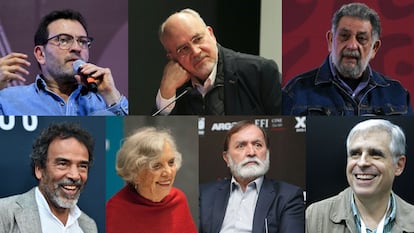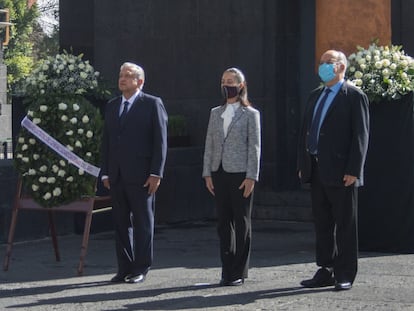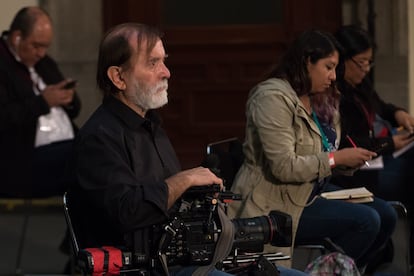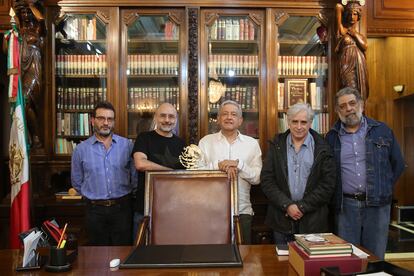What is the cost of belonging to López Obrador’s ‘intelligentsia’?
The Mexican president has named the intellectuals who support him, as opposed to those who have been allegedly “co-opted” by corruption. EL PAÍS spoke to some to see how they feel about being identified as friends of the government

The writer Jorge Volpi argues that collective manifestos carry less and less weight these days, and now have practically no influence or relevance in political terms. “The discrediting of the figure of authority as a whole […] further erodes the idea that they might serve some purpose,” he said in December during a graduation ceremony at New York University (NYU). Perhaps the strength of the “signed hereunder” no longer carries the importance it once did or has the ability to mobilize voters, but leaflets and manifestos signed by numerous hands have the capacity to stimulate discussion and at the same time to feed the eternal debate between what is published and what is public.
Since Andrés Manuel López Obrador’s election victory almost three years ago, Mexico’s intellectual community has dedicated several letters to the president with titles such as: ‘Against authoritarian drift and in defense of democracy,’ signed by 650 writers and academics in July 2020, ‘In defense of freedom of speech,’ published in September 2020, and most recently, ‘In defense of the Electoral Institute (INE),’ signed by almost 2,400 public figures including Enrique Krauze and Aguilar Camín, writer Ángeles Mastretta, political scientist José Woldenberg, anthropologist Roger Bartra, actors José María Yázpik and Daniel Giménez Cacho and academic Marta Lamas, among others.

A month after its publication, López Obrador railed against the signatories and accused them of being the same people who “backed the fraud in 2006,” alluding to the general election that he narrowly lost to Felipe Calderón of the National Action Party (PAN) and said those who have “monopolized all of the conventional media” had done so to his disadvantage. According to López Obrador, his political movement is only being backed by a small group “because the rest were coerced with grants and succulent contracts” during the time of former president Carlos Salinas of the Institutional Revolutionary Party (PRI). The president narrowed the support of the thinking class to a handful of “renowned intellectuals” who have been “consistent” in their ideas and singled out 13 names, among them Elena Poniatowska, historian Lorenzo Meyer, La Jornada opinion writers Enrique Galván and Pedro Miguel, producer Epigmenio Ibarra, director Luis Mandoki, actors Damián Alcázar and the Bichir brothers, writer Fabrizio Mejía and illustrators Rafael Barajas (also known as El Fisgón), José Hernández and Antonio Helguera.
López Obrador jokingly offered the collective his apologies “because I am placing them in the spotlight, although they are used to that.” EL PAÍS contacted half a dozen of them for this story. Others made their excuses based on time constraints and Hernández said he would prefer not to comment on the matter “because I do not consider myself an intellectual of the 4T [López Obrador’s Fourth Transformation movement] and, honestly, I have nothing to contribute.”
Among those who did talk about their inclusion on the list of “friends of the president,” historian Lorenzo Meyer acknowledged that he didn’t find it entirely disagreeable to be mentioned in the National Palace and that his ideals remain intact. Meyer identifies with the president in his proposal to “combat rampant corruption and the unjust distribution of income in the country.” The long friendship between the two started during López Obrador’s early political career in Tabasco in the 1980s and has not diminished, Meyer tells EL PAÍS. “For years we would see each other once or twice a year at my house or his, but since he assumed the presidency, we have not been in touch,” he says. Asked if he has laid aside his role as a critic to become an apologist for political power, Meyer says his stance has always been constant. “Before I was against the government and against the corrupt regime that brought it to power. Now I am not against the government but I remain opposed to the regime that designed this system and still shows no sign of changing.” As to the personal cost of aligning himself with López Obrador, the historian notes: “I used to be invited to give talks and that doesn’t happen anymore. It’s the same with the Spanish embassy. I used to know all the ambassadors but now I don’t receive invites to anything.”

Epigmenio Ibarra agrees with the president’s assertion that the intellectual landscape contains “a terrible imbalance.” Speaking to EL PAÍS, the audiovisual producer notes: “We cannot ignore the fact that for years we had one of the longest, most perverse and totalitarian regimes in the world. Because they had money and they censored the media, they killed off or coerced critical thought.” According to Ibarra, this is the basis for the current intellectual class “reviewing their contracts and their dealings with the PRI and PAN governments.”
Ibarra, who owns Argos, one of the biggest producers of soap operas in Latin America, adds: “I feel very proud to be included in a group of people for whom I have profound respect, even if I consider myself to be a minor character among them.” Discussing the consequences of his political activism, Ibarra speaks of the “number of insults and lies thrown at me every day. I am a witness to the last few decades in Mexico and Central America. I had the good fortune that López Obrador allowed me access to document his struggle but to these people I am not a journalist or a movie director, just someone who makes soap operas.”
The 13 intellectuals singled out by López Obrador have three things in common: age (they are all 53 or over), pride in being associated with the president, and all but one of them are men. None are young or among the new generation of voices that have joined the cause of López Obrador’s 4T in the wake of its overwhelming victory at the polls. Neither are they new faces in the sphere of public debate and all have at one time or another shared a struggle or a sit-in on López Obrador’s long battle for power. Being faithfully allied to a single cause is another defining characteristic.

Until now, with a few exceptions, the most recognizable faces among the thinking class were cautious when it came to openly expressing their support for the president in power. Prudency dictated that it was better not to speak too gushingly of an administration that would be in power for six years and tended to leave the post with a trail of broken promises, betrayals and dead bodies in its wake. Not one would have forgiven being publicly cited by a president. The most instructive recent case was that of former president Enrique Peña Nieto. His meteoric election campaign took a blow when he was incapable of saying which books had had an effect of his life during the 2011 Guadalajara Book Fair. The incident probably didn’t cost him any votes, but there was not a single writer, thinker or intellectual who wanted to be seen alongside him during his six-year tenure from 2012 to 2018. He was a pariah for the intelligentsia. That is not the case with López Obrador, with all of those mentioned in his early morning call, far from seeking to distance themselves from the president, feeling pride in being close to him and often stating in an echo of his famous campaign slogan: “It is an honor to be with Obrador.”
Historically, the relationship between intellectuals and the government in power in Mexico has been a story of love and hate since the Revolution, from the post-revolutionary zeal of “all of us together” to a definitive break after the Tlatelolco massacre and the later thawing of relations when Carlos Salinas came to power in 1988. During the Salinas administration, the intellectual class was divided between those gathered around the mast of literary magazine Vuelta, founded by Octavio Paz, and later Enrique Krauze’s Letras Libres, against the intellectuals of the Nexos Group, which later became known as the San Ángel Group, led by figures such as Jorge Castañeda and Héctor Aguilar Camín, who supported Vicente Fox’s presidential campaign in 2000. From that era, López Obrador maintains, emerged many of those who now belong to the “conservative intelligentsia” at the service of a “rapacious minority.”

Addressing López Obrador’s assertion of an intellectual imbalance (“more than 2,000 against the 10 that support us”), the La Jornada illustrator El Fisgón said in a recent interview: “In October 2020, 650 intellectuals published a letter (‘In defense of freedom of speech’, signed by figures such as Javier Sicilia, Enrique Krauze, Arturo Ripstein, Ángeles Mastretta, Héctor Aguilar Camín, Rafael Pérez Gay, Héctor de Mauleón, Valeria Luiselli and Jorge Castañeda, among others) that was reprinted in every newspaper and we responded with a letter that we couldn’t even pay to get published in La Jornada, our own newspaper, and we reproduced it on social media instead. Do you know how many people supported this letter? Almost 52,000 people signed this letter that was never published in the mainstream media but had a huge impact on social media, and that’s what balances it out,” said El Fisgón.
In the view of Pedro Miguel, the editor of the opinion section at La Jornada, López Obrador’s list was “restrictive and unfair,” and should have included more people “like Paco Ignacio Taibo II or Maria Luisa Albores, the environment secretary,” he told EL PAÍS.
According to Miguel, being among those on López Obrador’s list is concerning “because of the responsibility it implies” and because “it wasn’t among my life plans to be close to power or considered an intellectual,” he jokes. “The courtesans who criticize us and who were close to power forget three things: that we are allied to the political project of the left and have been since we were teenagers; that we are not for sale and I have not been paid a cent of public money, I live on my salary from the newspaper; and thirdly, we are not hypocrites, because we do not claim to be impartial or non-partisan,” he adds.
As El Fisgón summed up after appearing on Twitter with López Obrador after a lunch at the National Palace: “Those who didn’t like us now like us even less, and those who liked us, like us more. And that’s it.”
English version by Rob Train.
Tu suscripción se está usando en otro dispositivo
¿Quieres añadir otro usuario a tu suscripción?
Si continúas leyendo en este dispositivo, no se podrá leer en el otro.
FlechaTu suscripción se está usando en otro dispositivo y solo puedes acceder a EL PAÍS desde un dispositivo a la vez.
Si quieres compartir tu cuenta, cambia tu suscripción a la modalidad Premium, así podrás añadir otro usuario. Cada uno accederá con su propia cuenta de email, lo que os permitirá personalizar vuestra experiencia en EL PAÍS.
¿Tienes una suscripción de empresa? Accede aquí para contratar más cuentas.
En el caso de no saber quién está usando tu cuenta, te recomendamos cambiar tu contraseña aquí.
Si decides continuar compartiendo tu cuenta, este mensaje se mostrará en tu dispositivo y en el de la otra persona que está usando tu cuenta de forma indefinida, afectando a tu experiencia de lectura. Puedes consultar aquí los términos y condiciones de la suscripción digital.









































